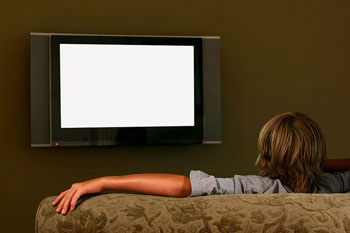A study carried out by the BBC’s research and development (R&D) team has revealed that the carbon footprint from watching TV programmes is greater than that from making the programmes themselves. As part of the Green Technology project, BBC R&D has been looking at media technology’s impact on the environment, and how any harmful effects can be reduced.
 |
| TV viewing leaves more carbon footprint than programme making |
While studying the carbon footprint of the television chain from start to finish (ranging from the production of a programme right through to the programme being viewed at home), researchers found that it is actually the viewing of the TV programme that has the greatest environmental impact, rather than the making of it.
Over recent years the number of electronic devices in homes has increased, and this has been accompanied by a rise in the level of individual viewing. This has resulted in a surge in total power consumption, leading to higher carbon footprint. The huge variety of consumer electronic devices involved in watching television programmes, from HDTV displays and set-top boxes to other mobile gadgets like laptops and tablets that households and individuals now use to enjoy TV programmes, means that energy consumption levels have rocketed, aggravating the negative impact on the environment.
The figures showed that making programmes accounts for only 12-35 percent of the carbon footprint associated with watching television. The energy consumption from making TV programmes was found to be far lower than the consumption from watching them.
Whilst there were different variations involved that affected the actual carbon footprint left by viewers, it was found that the biggest impact came from the display itself, with larger screens tending to use more power. Researchers involved in the project are now urging consumers to take energy consumption into consideration when choosing a TV set, which should be made easier once the EU energy labelling system is fully enforced for new TVs in the UK.
Source: BBC R&D Blog